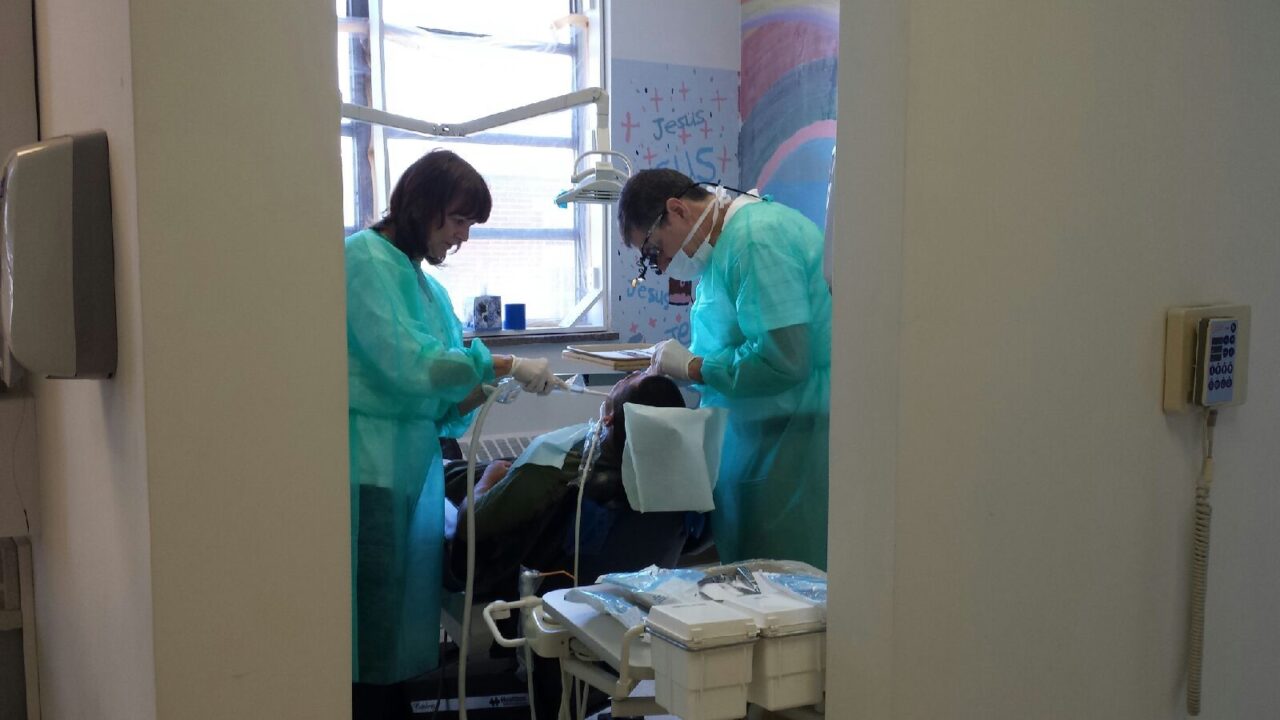Media

When the Poorest Fall Through
On a Friday near noon, on the top floor of Christ Lutheran Church, John Kiessling has patients occupying both chairs at his charity dental clinic. He buzzes from one to the other, trying to care for both before the free clinic—which caters to one of Harrisburg’s poorest neighborhoods—closes for the day.
Kiessling earns his living as a dentist in private practice, but three days a month he volunteers, treating patients who can’t afford their own dental care. It’s a passion for the salt-and-pepper haired dentist, who has spent the last few years inspiring another 20 colleagues from the Harrisburg Area Dental Society to volunteer with him.
The free clinic fills an important gap for the poor. Most dentists don’t take Medicaid patients, because the reimbursement they get from the government health program for the poor is so low. That means the clinics that do accept Medicaid often have long waiting lines. And for those who can’t afford even the small Medicaid co-pay, many go without dental care for years, allowing cavities and other problems to fester until crisis point.
“I look at us as the safety net under the safety net,” Kiessling says. He adds that most people don’t know the government safety net has holes when it comes to health care. Take the case of Maryland boy Deamonte Driver, who despite having access to Medicaid, died when the infection of a mouth abscess spread to his brain.
Kiessling says the dental health of most of his patients—many of them poor immigrants—is often terrible. The charity clinic doesn’t do root canals or appointments, so much of the care Kiessling and his fellow dentists perform involves damage control: Treating infections, relieving pain and filling teeth.
As Dr. Kiessling examines patients, dental assistants sterilize instruments and prepare others on expensive equipment. When you factor in the time the dentists donate, the clinic distributes about $100,000 of services for free. To get it started, the church raised tens of thousands of dollars, and it relies on community grants to get and maintain supplies.
The charity dental clinic is a model Kiessling would like to see mushroom around the city and state. He notes that much of the problem is reaching troubled communities before their residents become difficult patients with years of bad habits to overcome.
Kiessling would like to see legislators craft health policy for the poor that incentivizes his kind of charity work, to encourage more dentists and doctors to pitch in with their time and skills. He doesn’t think such a charity model could cover all the health needs for the poor. But knowing the wait times, long lines and patchy service Medicaid offers, he’s convinced that simply expanding the government program won’t do the trick either.
Rather, Kiessling thinks a combination of government programs and expanding charity care will help more people. As he writes patient notes at his desk after Friday clinic, he muses on his motivation for coming at all. He’s blessed with a wife and three children and a good income, and his faith drives him. “How could you not?” Kiessling asks.
Dr. Kiessling is right, government too often overlooks private charity, and at the same time it’s often blind to short-comings in the current safety net. Government should encourage charity care, while allowing patients to have a larger stake in their care. That means more patient choice when it comes to insurers and services, such as dental care. It also means more patient responsibility, allowing patients to be rewarded for cost-effective care and discouraged from unnecessarily expensive care, like getting x-rays at a hospital instead of an out-patient facility.
It’s time for Harrisburg to take a serious look at reforming the safety net, continuing and now expanding the status quo will only ensure more Pennsylvanians fall through the safety net.